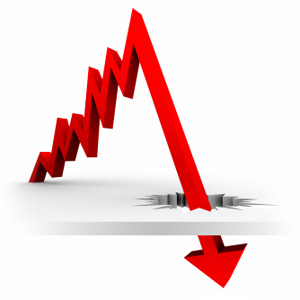
It's not yet known if this severe financial crisis is over completely but there is no doubt that it has eased in the past few months.
And this is bad news for all brokers, including Forex ones.
Forex traders prefer turbulent economic times because Forex markets are very volatile as a result and respond more strongly to any economic news. Volatility leads to larger profits for some and larger losses for the others. Some trading systems can only operate in volatile markets. When markets are calm traders tend to place less trades as there are less triggers to trade, less 'action' and less 'blood' in the air in general. On the other hand this in part is offset by returning fundamental traders who tend to take a step back when markets are irrational.
For Forex brokers this means lower volumes which means less commissions which in turn is directly reflected in the P&L statements. For market makers this means less traders losses.
We have already seen the signs of that in IG Index's quarterly report a month ago which showed decline in Forex growth in UK, Australia and Japan (was offset by increased equities trading).
Today we see that the trend continues across all financial instruments with London Capital Group reporting a large decline in profits amid strong growth in number of clients. On the other hand Institutional Forex business reported a very strong growth, rising 41%.
What does this tell us? Just like I wrote in the IG Index's post - retail forex growth is slowing down in emerging markets and is expected to slow down or even decline as the markets calm down and traders stop betting and start actually investing in equities instead. Retail brokers should expand to emerging markets and/or offer additional products.
On the other hand, institutional trading which is more conservative by nature and which tumbled by 25% worldwide is expected to restart its growth. LCG's report is the first sign for that.














